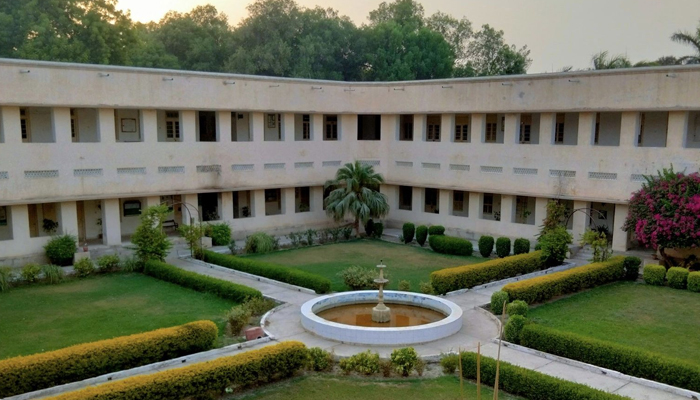4,203 students take Sindh Agriculture University entry tests
HYDERABAD: In a first for the Sindh Agriculture University (SAU), Tando Jam, the educational institute on Sunday held entrance tests at centres in Quetta, Hyderabad, Umerkot and Sukkur simultaneously for the academic year 2023-24.
The tests were taken by 4,203 students, including 550 female candidates, from across the country, with 3,146 students aspiring to enrol in the pre-medical undergraduate programme, 988 in the pre-engineering programme, 52 in the pre-computer programme and 17 in other courses.
In Hyderabad the test was conducted at the Public School Latifabad, where 56 blocks were set up, including nine separate blocks for female candidates. Eighteen blocks were established in Sukkur, 15 in Umerkot and four in Quetta.
A total of 2,821 students will get admissions at the university, and its affiliated colleges and sub-campus after clearing the test. SAU Vice Chancellor Dr Fateh Marri visited the Hyderabad centre and expressed his satisfaction over the arrangements made for the entry test.
In August the SAU and the Sindh Higher Education Commission (SHEC) had co-hosted a two-day seminar titled ‘Seed Sector: Challenges and Options’ at a hotel.
Experts on the occasion emphasised the need for establishing a joint forum based on national agricultural institutions, policymakers and breeders to improve livelihood and protection of food in the country. They also proposed legislation and genetic inspection to prevent defective seeds in the country, and to certify imported seeds.
SHEC Chairman Dr SM Tariq Rafi said that there was scope for more research in the agriculture sector, which could play an essential role in the development of the country. “We will release grants for research proposals so that researchers can come up with various projects, including new seed varieties.”
Sindh Agriculture Secretary Qazi Aijaz Mahesar said that the first forum of this kind had been established. He said that new legislation should be carried out for the seed sector.
University of Agriculture Faisalabad VC Dr Iqrar Ahmed Khan said that the role of universities in agricultural research was important. He said that research of universities should not be limited to academic use only, but it should extend to application as well. He said that 500 varieties of different seeds were approved.
SAU VC Dr Marri said that there was a need for this kind of high-level forum on seeds in Pakistan, as the country was dealing with an acute shortage of certified seeds due to climate change and economic problems.
He said that increasing production per acre and growth in the country’s GDP now depended only on better seeds, and the important sector of the country’s development was running without a forum. Pakistan Agriculture Research Council Chairman Dr Ghulam Muhammad Ali said that there was a need to focus on the production of genetically modified seeds in the country. “There is a tradition of research on seeds in multinational companies in Pakistan, but the majority of local companies are working as traders.”
-
 Andrew's Epstein Scandal: Will King Charles Abdicate Following King Edward's Footsteps?
Andrew's Epstein Scandal: Will King Charles Abdicate Following King Edward's Footsteps? -
 Billy Joel Leaves Loved Ones Worried With His 'dangerous' Comeback
Billy Joel Leaves Loved Ones Worried With His 'dangerous' Comeback -
 Prince William Dodges Humiliating Question In Saudi Arabia
Prince William Dodges Humiliating Question In Saudi Arabia -
 Dax Shepard Describes 'peaceful' Feeling During Near-fatal Crash
Dax Shepard Describes 'peaceful' Feeling During Near-fatal Crash -
 Steve Martin Says THIS Film Has His Most Funny Scene
Steve Martin Says THIS Film Has His Most Funny Scene -
 Kensington Palace Shares Update As Prince William Continues Saudi Arabia Visit
Kensington Palace Shares Update As Prince William Continues Saudi Arabia Visit -
 Fugitive Crypto Scammer Jailed For 20 Years In $73m Global Fraud
Fugitive Crypto Scammer Jailed For 20 Years In $73m Global Fraud -
 Will Andrew Mountbatten-Windsor Finally Go To Jail Now That King Charles Has Spoken Out? Expert Answers
Will Andrew Mountbatten-Windsor Finally Go To Jail Now That King Charles Has Spoken Out? Expert Answers -
 Melissa McCarthy Reveals Her Tried And Tested ‘corpse’ Night Time Routine That’s Lost Her 95lbs
Melissa McCarthy Reveals Her Tried And Tested ‘corpse’ Night Time Routine That’s Lost Her 95lbs -
 Horrifying Pictures Of The Kidnapper Of Savannah Guthrie's Mother Released
Horrifying Pictures Of The Kidnapper Of Savannah Guthrie's Mother Released -
 Andrew's Ex-girlfriend Launches Brazen Attack On Epstein Victims On Piers Morgan Show
Andrew's Ex-girlfriend Launches Brazen Attack On Epstein Victims On Piers Morgan Show -
 Andrew Mountbatten-Windsor 'on His Own' As Palace Gives Green Light To Law Enforcement
Andrew Mountbatten-Windsor 'on His Own' As Palace Gives Green Light To Law Enforcement -
 Kanye West's Tweet About Super Bowl Halftime Resurfaced After Bad Bunny's Show
Kanye West's Tweet About Super Bowl Halftime Resurfaced After Bad Bunny's Show -
 'FBI' Star Juliana Aidén Martinez Tease Her Return To 'Law And Order: SVU' After Quitting
'FBI' Star Juliana Aidén Martinez Tease Her Return To 'Law And Order: SVU' After Quitting -
 Cardi B's Emotional Words To Pal Amid Stefon Diggs Rumored Breakup Revealed
Cardi B's Emotional Words To Pal Amid Stefon Diggs Rumored Breakup Revealed -
 Princess Eugenie Breaks Cover Amid Explosive Family Scandal
Princess Eugenie Breaks Cover Amid Explosive Family Scandal




